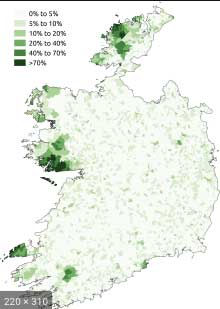The origin of the English language is a very interesting topic and it is worth taking a cultural dive into the history of humanity in order to discover some secrets about this language.
We will address some curious aspects, and of course, it will be of great value to your English language learning.
Many people are learning English as a second language, but few care about the origin of it. I believe the same situation applies to natives.
They speak the language, but they may be unaware of the language's rich history. Are you curious to learn?
What is the Origin of the English Language? It all started with the Celts...
Humanity has many intriguing stories, and the origin of the English language is no different. In fact, English has many influences, but it was born in the region of Great Britain.
There were several political, social and religious factors that were at play, but the Land of the Queen has always been desired by different peoples. Let's learn more about them.
It all started with the Celts. Around the year 1000 BC the first distinct languages appeared and Celtic was one of them.
For eight centuries the Celts inhabited the European region that today comprises Britain, Ireland, Germany, Spain and France. In fact, this was the most important language in the region.
The Introduction of Latin Words into English With the Arrival of the Roman Empire
The Roman Empire arrived in the region and Emperor Julius Caesar invaded the British region between 54 and 55 BC.
In the year 44 AD there was another invasion under the command of Emperor Claudius, in which the most important British island was annexed to the Roman Empire. From then on, Latin became an important language in the region.
In the year 410 the Romans left the region of Great Britain, and 39 years later (449), the Anglo-Saxons arrived in the region, and they introduced some words of Latin origin into the language.
A Little More About the Anglo-Saxons

Rome, after going through a series of difficulties and problems during their Empire, decided to leave the British region in the year 410 AD.
At this time, the Celts came under the rule of unfriendly tribes that were situated in the northern region. As a solution, they decided to seek help from the Germanic tribes in the year 449.
The Anglo-Saxons took advantage of the situation and became invaders, and turned southeastern Britain into a wealthy region.
They killed many people, the surviving Celts sought refuge by hiding in the western region. We can say that the Celtic language was practically extinct at that time.
Old English, Middle English and Modern English
Germanic dialects were responsible for the origin of English. See this example: ENGLAND – its origin is ANGLE-LAND which means LAND OF ANGLES.
Over time, English became divided into three parts: OLD ENGLISH, MIDDLE ENGLISH and MODERN ENGLISH.
What is the origin of the English language? - Old English
It appeared in the second half of the 5th century. This first version of the language is practically incomprehensible if we compare it with current English.
As far as grammar and pronunciation are concerned, they were also totally different. There were glaring differences: adjectives used to have a gender, that is, it was possible to differentiate masculine from feminine adjectives, in addition to other characteristics...
What is the origin of the English language? - Middle English
This was a period where there was a strong influence of the French language in English. This time lasted three centuries and, of course, new words and expressions were created, mainly in administrative, social and political areas.
Some words of Germanic origin over time also disappeared, giving rise to new French words.
What is the origin of the English language? - Modern English
Time passed and new technologies and innovations appeared. Gutenberg's printing press appeared in 1450, as well as the post office in 1516. This helped make it possible for new words to be created, mainly from the London dialect, which commanded the main administrative and political centre of England.
Furthermore, this brought benefits to the country's education, improving the quality of education for the population.
Spelling reforms were also part of this process, as well as the emergence of dictionaries (in 1755, Samuel Johnson). You can read about the best dictionaries to learn English in a blog post coming soon.
English pronunciation also underwent major changes throughout this period of evolution of the language. There were also new grammatical concepts, such as the auxiliary verbs of the present and the past, and of course, printed material helped a lot in the standardisation of the English language.
Details Regarding the English Language
In the 15th and 16th centuries there was a radical change in the pronunciation of vowels, and many consonants were no longer pronounced.
Diphthongs also underwent changes, all of this happened quickly and steadily.
Of course, even today, new words appear all the time in English, such as words from young people, slang, expressions, abbreviations, and social networks greatly influence what happens in the modern world. You can read about curiosities of the English language in a blog post coming soon.
In this way, the evolution of a language is constant, and words will still find their way into dictionaries.
As we mentioned, French had a big influence on the English language, and we can see some examples: the verb ANSWER (Anglo-Saxon origin), had the French RESPOND as a synonym. Anglo-Saxon END and French FINISH, Anglo-Saxon ASK and French QUESTION are just a few examples.
In computing there are several terms in English that are used in different languages, such as: HARDWARE, SOFTWARE, FIREWALL, MOUSE, SCANNER, and many more.
We can see that over the years, globalisation has arrived, and English has become the main language of the world.
It is used in e-commerce, online and face-to-face meetings, imports, exports, purchases, informal conversations, and even in the most traditional sandwich chains!
Learn A Little About Spoken English in Ireland
The Celts greatly influenced the English language of Ireland. A detail you may not know: Ireland has two languages, English and Gaelic, which Irish people simply call Irish. Gaelic, or Irish, was once the main language before the English took over the island, which occurred during the Middle Ages.
Currently, only 2% of the Irish population speaks Gaelic/Irish natively and these people live mainly in very rural areas far from the reach of Dublin in the east.

Do you know when the English arrived in Ireland? In the 13th century the English brought this language and when the Tudors conquered Ireland in the 17th century, English became more used in commercial, administrative and judiciary environments.
Did you know that within the country there are different dialects? Depending on the region, the Irish language may differ in especially in pronunciation.
Two quick examples of Irish:
My name is Gordon = Gordon is ainm dom
I am well = Tá mé go maith
You can see the Irish language has accents similar to many languages including Portuguese but which are not sued in English. It is a completely different language to English.
Of course, the Irish accent has its beauty, as does the American or Canadian accent, so it's all a matter of adapting and getting to know what those people say on a daily basis.
If you live in Ireland then you can get to know in depth not only the pronunciation and grammatical inclinations, but also the culture of this very receptive people.
You can also find out how English influences other countries like Brazil here.
Differences Between British and American English
English arrived in the United States through British colonisation. After independence, around 4 million Americans were descended from English settlers, which led to the growth of the language and its adoption by the population.
We can say that American English is traditional by abbreviations, both in spoken and written language. The American accent is also very characteristic, the result of contact with other languages and dialects.
Spelling is another factor that sets the two countries apart. See these examples:
GRAY (United States) – GREY – (England)
TIRE (United States) – TYRE – (England)
ORGANIZE (United States – ORGANISE (England)
DEFENCE (United States – DEFENSE (England)
These are just some examples. The pronunciation also has interesting differences, and you can learn more about them by clicking here.
If you want to know more about the differences between British and American English, there are 4 videos in our online video course for sale on Udemy for €29.99/69.99R$: "Eliminate the Mistakes Portuguese Speaking People Make in English". 4 hours of video exclusively for people who speak Portuguese.
You can read more about it and watch free videos here.
We can cite as an example the vowel A which is pronounced with the back of the mouth in England, while in Uncle Sam's land it is spoken with the front part.
The letter R is very strong in the United States in all words, but in England it is spoken before vowels, and in consonants, the sound is shorter.
Many people consider the British to be slower when it comes to speaking, while the American speaks faster, but of course, as in any country, accents vary by region.
If you go to Texas, you will hear a very different pronunciation than people who live in Florida, for example.
The same can be said about Great Britain – each country has its own character. The ideal is to get to know each region and learn on a daily basis with them and improve your English.
What is certain is that this language is very beautiful to learn and speak, both in your academic, personal and professional life.
Other English Speaking Countries
Canada and Australia are other countries that also have their own characteristics. You can read about countries that speak English as a second language here.
In fact, if you go to Asia, you can speak English with Japanese, for example, if you go to Central America too, as well as South America.
Each country has its own accent, and it's up to you to study one by one according to your needs. This is the beauty of language learning.
We learn every day and the internet is there to help us through websites, songs, audios, videos, etc. Knowledge does not take up space! Always read about this topic and deepen your knowledge even more.
You might also be interested in knowing why English is considered the international language.
If you want, learn here the 10 most common mistakes and tips in English to improve your knowledge or click here to know some of the best books to learn grammar or learn about vocabularies about the solar system in an article coming soon.
Did you know about the origin of the English language? Did liked it? Leave in the comments below!
